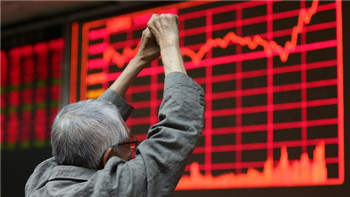(单词翻译:单击)

China’s benchmark stock index closed down nearly 1 per cent on Monday, taking the combined losses for August to 12.5 per cent, following July’s fall of 14.3 per cent.
中国基准股指上证综指周一收盘下跌近1%,这使得该指数的8月累计跌幅达到12.5%,7月总跌幅为14.3%。
The smaller-cap Shenzhen Composite Index fell 3.1 per cent Monday, pushing it down 15.2 per cent in August, its worst monthly performance since August 2009.
市值较小的深证综指周一下跌3.1%,8月累计下跌15.2%,为自2009年8月以来最糟糕月度表现。
Monday’s fall came after a week of wild swings in which the Shanghai Composite index saw its largest two-day sell-off in more than two decades on Monday and Tuesday, but then rallied more than 10 per cent at the end of the week.
此前一周,上证综指出现剧烈波动,在上周一和上周二遭遇20多年来最大两日跌幅,但在上周尾声反弹逾10%。
That rebound followed Beijing’s decision to cut interest rates and inject cash into the banking system by cutting the reserve requirement ratio — the portion of deposits banks must hold in reserve with the central bank.
在股市反弹之前,中国政府决定降息,并通过下调存款准备金率向银行体系注入资金。
Chinese volatility spilled over into global markets as investors questioned the competence of Chinese policymakers and the true extent of the current slowdown in China.
中国股市的波动性蔓延至全球市场,投资者对中国政策制定者的能力以及中国经济真实放缓程度提出质疑。
State-owned funds and institutions also helped the rally late last week by jumping into the market on Thursday to support falling prices, having stood on the sidelines earlier in the week.
上周四,国有基金和机构在此前几天离场观望后,进入市场支撑不断下跌的股价,这也推动了上周结束时股市的回升。
“The market is not completely short of liquidity and it’s already started to stabilise after the [central bank] cut rates last week,” said Du Changchun, an analyst at Northeast Securities. “People also expect some support before major events like the upcoming victory day parade.”
“市场并不完全缺乏流动性,在(央行)上周降息后已开始趋稳,”东北证券(Northeast Securities)分析师杜长春表示,“人们还预测在即将到来的抗战胜利纪念日阅兵等重大活动前夕,市场会获得一些支撑。”
But Monday’s decline may have been partly influenced by a government decision, first reported in the Financial Times, to wind down this state-directed stock buying and focus instead on punishing people the government suspects of “manipulating markets.”
然而,周一的下跌可能在一定程度上受到中国政府做出的一项决定的影响,英国《金融时报》首次报道了这一消息:中国政府决定结束由政府主导的购股举措,转而专注于惩罚政府怀疑“操纵市场”的人员。
The huge share-buying programme that was launched at the start of July in the midst of a market rout has already seen government entities spend more than $200bn in a vain attempt to prop up over-priced stocks.
7月初,在市场暴跌之际,中国政府推出大规模购股计划,政府机构已支出逾2000亿美元支撑被高估的股票,但收效甚微。
Most of the shares bought by the government’s main rescue fund have fallen significantly in value since the fund bought them, according to Chinese media reports based on a partial analysis of its publicly-disclosed purchases.
根据中国媒体基于对公开披露的购股举措的部分分析的报道,政府主要救市基金买入的大部分股票在买入后价格大幅下挫。
When the government announced its stock rescue package in early July it said it intended to defend a Shanghai Composite “bottom line” of 4,500 points.
7月初,当中国政府宣布其救市计划时,它表示计划守住上证综指的4500点“底线”。
The index closed Monday at 3,206 points, well below the high of 5,166 it reached in early June. The index is down slightly for the year to date but still up 45 per cent from this time a year ago, suggesting that stocks may have a much further to fall.
周一,上证综指收于3206点,远低于6月初触及的5166点最高点。今年迄今,该指数略有下跌,但相比去年此时仍高出45%,似乎表明股价有进一步下跌空间。
On Monday, the market was down nearly 4 per cent at one point before staging a late rally that was driven by the largest cap stocks.
周一,上证综指一度下跌近4%,而后在大盘股的推动下上演尾盘反弹。
Over the past two months, state-directed stock buyers have focused their efforts on large-cap stocks as they sought to prop up the benchmark index.
过去两个月,听从政府指示的股票买家在试图提振基准股指时一直将购股举措集中在大盘股上。
Monday’s late rebound was interpreted by some analysts as a sign that state-directed buying may not be completely over, despite the government’s decision to abandon large-scale purchases.
一些分析师认为,周一的尾盘反弹表明,尽管中国政府决定放弃大规模购股举措,但政府指示的买入行为可能尚未完全结束。


